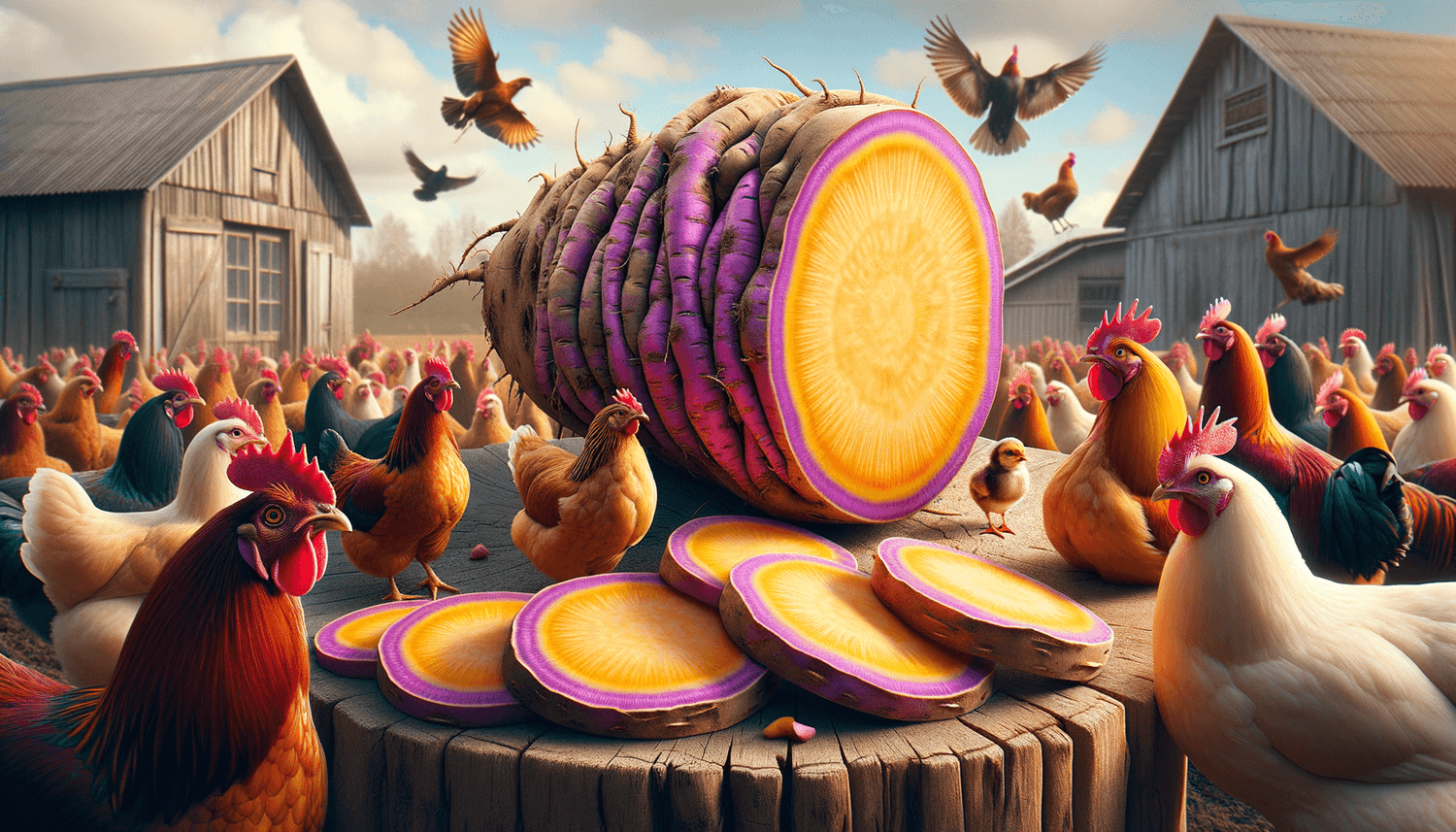Cluck, cluck, fellow chicken enthusiasts! Are you wondering whether you can share the delicious and nutritious yams from your kitchen with your beloved backyard chickens? Well, you’ve come to the right place! As we peck into the world of yams and chickens, we’ll uncover the scrumptious truth about feeding these starchy delights to your feathery friends. Get ready to cluck and roll as we learn about the importance of a balanced diet, the benefits and risks, the nutritional value, and even how to prepare yams for your chickens’ dining pleasure. So, let’s flap our wings and dive right in!
Can chickens eat yams?
Yes, chickens can indeed eat yams, and it is safe for them to do so! Yams are a nutritious snack for your backyard buddies, as they contain essential vitamins and minerals that can contribute to their overall health. However, it’s important to prepare and serve yams properly to ensure they’re easy for your chickens to digest and enjoy.
A balanced diet for happy, healthy chickens
Just like humans, chickens need a balanced diet to remain happy and healthy. This not only ensures they thrive, but also lays the foundation for top-notch egg production. A chicken’s diet should primarily consist of a high-quality chicken feed, which should make up around 80-90% of their diet. This chicken feed is specially formulated to provide all the essential nutrients, vitamins, and minerals our feathery friends need for optimal health and egg production.
The remaining 10-20% of their diet can consist of treats like fruits and vegetables. Providing treats not only adds variety to their diet, but also offers an engaging and enjoyable experience for the chickens. Remember, though, that moderation is key. Treats should be provided in small quantities to avoid upsetting the balance in their diet. When our beloved backyard birds have a well-balanced meal plan, they’re sure to rule the roost and reward us with delicious, nutritious eggs.
Nutritional value of yams for chickens.
Feeding yams to chickens provides them with valuable nutrients that can complement their daily diet. Yams are packed with essential vitamins, such as vitamins A, B6, and C, which contribute to overall health and well-being. The vitamin A in yams supports good vision and skin health, while vitamin B6 plays a vital role in the formation of red blood cells and the proper functioning of the nervous system. Furthermore, vitamin C is important for a strong immune system and helps chickens better handle stress.
Aside from these vitamins, yams also contain crucial minerals such as potassium, magnesium, and iron. These minerals are important for a range of bodily functions in chickens, including maintaining proper fluid balance, bone strength, and oxygen transport. Moreover, yams have a high water content, which can help in keeping your chickens hydrated, especially during hot summer months.
While yams do provide these nutritional benefits, it’s important to remember that they should not replace a high-quality chicken feed. The vitamins and minerals provided by yams can supplement the essential nutrients already present in their main feed, but the yams themselves should only be given in moderation as a treat. In doing so, you can be confident that your backyard chickens are receiving the right balance of nutrients in their diet.
Nutrition table of yams for chickens.
| Information | Description |
|---|---|
| Nutritional Value | Rich in vitamins A, B6, and C, and minerals like potassium, magnesium, and iron. |
| Suggested Serving Size | Small portions in moderation, making up no more than 10-20% of their diet. |
| Safe Feeding Practices | Never replace high-quality chicken feed with yams. Yams should only be a treat. |
| Preparation | Cook and chop yams into smaller pieces before feeding to chickens. |
| Potential Risks | Overfeeding yams can cause an imbalanced diet and obesity in chickens. |
| Hydration | The high water content in yams can help keep chickens hydrated. |
| Digestion | Cooked yams are easier for chickens to digest than raw yams. |
| Seasonal Availability | Yams are typically available year-round, but their peak season is in the fall. |
| Other Benefits | Offering variety in their diet and promoting their natural foraging behaviors. |
Preparing yams for your chickens
When serving yams as a treat to your chickens, it’s essential to take some extra steps in the preparation process. Make sure to cook the yams thoroughly, as this will make them softer and easier for your chickens to digest. Boiling or steaming are great options, but avoid using any additional seasonings or spices, as these might not be safe for your chickens to consume.
After cooking the yams, let them cool down to room temperature, and then cut them into smaller, bite-sized pieces. This helps to prevent choking hazards and ensures that the yams are more manageable for your feathery friends to peck at.
Alternative treats for your backyard chickens
In addition to yams, there are plenty of other fruits and vegetables that can serve as nutritious and enjoyable treats for your backyard chickens. Some great options include leafy greens, melons, berries, pumpkin, and grated carrots. Just remember to keep these treats as supplementary to their main diet of high-quality chicken feed and keep the portion sizes small and balanced.
Yams are a nutritious and safe treat for your backyard chickens, offering valuable vitamins and minerals in addition to hydration benefits. As with any treat, moderation is key, ensuring that yams are given in small portions alongside their primary chicken feed. By preparing the yams properly and maintaining a balanced diet, you’ll not only promote the overall health and happiness of your chickens but also help them lay tasty, nutritious eggs for you to enjoy.

















